So you’ve heard about essential oils and how some people have used them to beat acne, but aren’t quite sure whether they work or how you should use them.
Perhaps you are looking for something more reliable than ‘I used essential oils for three days and now my acne is gone’ stories? If so, you’ve come to the right place. In this post, I’ll break down what science really says about essential oils for acne, which work the best and how to use them.
According to several studies, “the best essential oils for acne” based on their antibacterial, anti-inflammatory, antioxidant, anti-stress, and sebum reduction properties are:
- Tea tree oil
- Lavender oil
- Oregano oil
- Lemon oil
- Rosemary oil
- Eucalyptus oil
- Peppermint oil
- Thyme oil
How to Use Essential Oils to Treat Acne
There are a few things you need to keep in mind before you start using essential oils on your skin.
- You should never apply them directly on the skin. Essential oils are among the most irritating natural substances and you should always dilute them into carrier oil.
- Essential oils are natural substances and the concentration of active ingredients can vary from batch to bath. Always do a patch test on your wrist or under the chin to see how your skin reacts to each individual oil. Basically, if you get an allergic or irritant reaction, you don’t want your entire face to turn red and puffy.
Here are the steps to mixing and using essential oils.
- Choose your preferred essential and carrier oils – details on both below.
- Mix enough essential oils to get to 2 to 5% concentration. If you go higher than this, you risk irritating your skin. In some cases, even 5% concentrations can be irritating. Start low and build up slowly. Check the chart below for how much to mix to get your desired concentration. A good rule of thumb is that 1 drop of essential oil per teaspoon of carrier oil yields 1% concentration.
- Mix well to ensure essential oil is dissolved evenly. If you don’t mix properly some parts of your skin may be exposed to irritating concentrations of the essential oil.
- Use the mixture in place of normal moisturizer. It’s recommended to wash your face first to get the best results. Not washing your face means there’s an oily barrier on top of your skin that makes it harder for the essential oils to penetrate.
- After 15 to 20 minutes you can wipe your skin if it feels like the carrier oil left your skin looking and feeling oily.
Are essential oils safe?
Despite being natural, keep in mind that essential oils are potent substances that may result in severe skin irritation or other harm. However, diluted properly, most essential oils are relatively safe to use. Some, like citrus essential oils, can make the skin more sensitive to sunlight and you should always wear sunscreen after using them.
The best essential oils for acne
With concerns over bacterial resistance to antibiotics, researchers have started looking for alternative treatments to acne. Over the past few years, several interesting studies on essential oils and their anti-acne properties.
An interesting study was published in the journal of Evidence-Based Complementary and Alternative Medicine in 2017. In this review paper, the researchers looked at all the published studies on the antimicrobial effects of essential oils on skin-relevant bacteria. Combing through all the published studies, they found that the following essential oils are the most effective against P. acnes and S. epidermidis, the two bacteria associated with acne.
- Abies koreana (Korean fir)
- Anthemis aciphylla var. discoidea (chamomile)
- Cinnamomum zeylanicum (cinnamon)
- Citrus aurantium (bitter orange)
- Citrus medica limonum (lemon)
- Cymbopogon citratus (lemongrass)
- Juniperus communis (juniper)
- Kunzea ericoides (Kānuka)
- Lavandula angustifolia (lavender)
- Leptospermum scoparium (manuka)
- Melaleuca alternifolia (tea tree)
- Mentha piperita (peppermint)
- Mentha spicata (spearmint)
- Origanum vulgare (oregano)
- Rosa centifolia (rose)
- Rosmarinus officinalis (rosemary)
- Syzygium aromaticum (clove)
- Thymus vulgaris (thyme)
- Zingiber officinale (ginger)
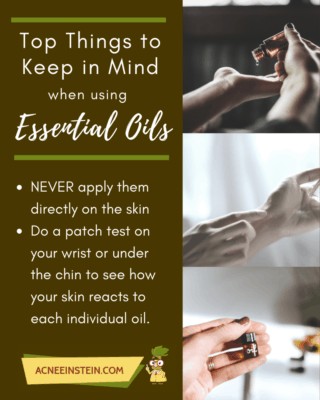
The most effective essential oil blends for acne
Essential oils may have synergistic effects and the right blend can be more effective than one essential oil alone. That being said, the vast majority of essential oil combinations do not have any synergistic effects, and a combination of two random essential oils is likely to be no more effective than either one alone.
The key is to combine the right oils. Fortunately, scientists have been busy pinpointing those combinations.
A study published in the journal Phytotherapy Research in 2017, compared antimicrobial effects of essential oils of clove bud, rosewood and litsea and their blends against known anti-acne antibiotics clindamycin and erythromycin.
The researchers also tested different blends of the essential oils in order to find the most effective combination against acne causing bacteria. Their results showed that the most effective combination blends the essential oils in the following ratio:
- May chang (Litsea cubeba): 5 parts
- Clove bud (Syzygium aromaticum): 1 part
- Rosewood (Aniba rosaeodora): 1 part
The researchers concluded:
Ternary combination of litsea, clove bud and rosewood EOs, have equivalent or even greater antimicrobial activity than that of clindamycin phosphate, erythromycin or both.
South African researchers published another interesting paper in International Journal of Cosmetic Science in 2018. In this study they tested 70 essential oils in 408 different combinations and how effectively they kill acne-relevant bacteria. The researchers identified 167 combinations with notable antimicrobial potential, but only a handful of combinations where the essential oils had synergistic effects, i.e. the combination was significantly more effective than either essential oil alone.
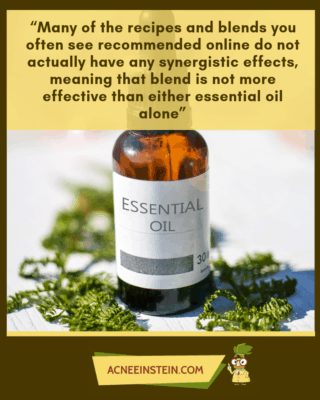
Here are the combinations that showed synergistic effects:
- Peppermint & eucalyptus
- Peppermint & pine
- Lavender & sage
- Bay laurel & juniper
- Myrrh & ylang ylang
- Orange & ginger
- Bergamot & tea tree oil
- Petitgrain & ylang ylang
- Ylang ylang & manuka
- Norwegian Angelica (Angelica archangelica) & mangarin
The researchers also tested various ratios of the above combinations. Somewhat surprisingly, the ratios do not seem to matter that much as long as one of the essential oils does not completely dominate the other. This means that you can keep it simple and combine these in 1:1 ratio for best results.
Interestingly, the researchers wrote:
It was found that not one of the synergistic interactions identified were based on the combinations recommended in the layman’s aromatherapeutic literature.
In other words, the recipes and blends you see often recommended online are not actually any more effective than either essential oil alone.
Comments on individual essential oils
We often get questions regarding individual essential oils and their effectiveness on acne. Here are some of the more common ones.
Tea tree oil
Tea tree oil is perhaps the most effective essential oil for acne. You may consider the products that contain 5 or greater concentration of tea tree oil if you have mild-to-moderate acne.
Effectiveness
According to a review study, five studies that evaluated the anti-acne effects of tea tree oil found that products containing 5 percent tea tree oil reduced the number of lesions from 61 to 23 percent when the participants used them 4 to 8 weeks two times a day.
Another study concluded that 5 percent tea tree oil gel was an effective treatment for mild to moderate acne. In the study, participants who used tea tree oil gel had significantly fewer and less severe lesions compared to those who used the placebo product.
Properties
Tea tree oil has two properties that may make it a useful alternative in acne treatment. These are:
- Antibacterial – Has moderate activity against the acne-causing bacteria P. acnes.
- Anti-inflammatory – A growing body of evidence shows that acne is primarily an inflammatory process that may occur even in the absence of P. acnes.
Animal studies and lab experiments suggest tea tree oil reduces inflammation by blocking the production of pro-inflammatory substances. In addition, it also suppresses the growth of P. acnes, which indirectly reduces inflammation as the bacterial growth is a potent stimulator of inflammation.
Safety
Tea tree oil is considered generally safe for external use. However, it may cause skin dryness, stinging, itching, scaling, redness, and burning sensations at the site of application. Interestingly, the side effects may be less severe than those caused by benzoyl peroxide.
One study revealed that nearly 5 percent of tea tree oil users develop allergic skin reactions.
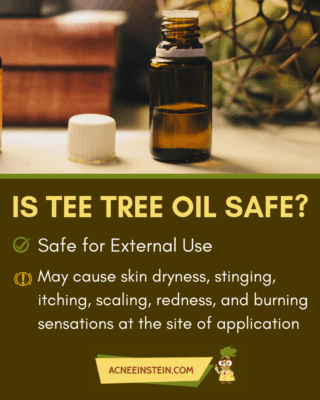
Lavender oil
Lavender essential oil effectively kills the bacteria causing acne. Its effectiveness can be further boosted by combining it with pine essential oil. Lavender can also reduce stress when used in aromatherapy, making it one of the best essential oils for acne.
Properties
- Anti-stress and mood stabilizing
- Antibacterial
Safety
Scientific studies suggest that using lavender oil on the skin, taking it by mouth, or inhaling it is likely safe provided you use it in the amounts mentioned in the label or directed by the medical professional.
However, the safety of lavender oil in young boys is still a major concern. There have been reports of gynecomastia in boys aged 7 to 10 years who used lavender oil on their skin.
If you are pregnant or breastfeed, you should avoid taking it by mouth.
Oregano oil
Oregano essential oil may reduce acne by killing the bacteria known to aggravate it. Studies have shown it’s among the most effective antimicrobial essential oils. Laboratory studies show it also has anti-inflammatory effects, meaning it may reduce redness and irritation associated with acne. In a mouse study, oregano oil formulation performed better than the antibiotic erythromycin.
Properties
- Antibacterial
- Anti-inflammatory
Safety
Though oregano has a long history of use in numerous ailments including acne, its safety and standard dose are not well established.
Taking large doses by mouth may be potentially life threatening, reports WebMD. Women who are pregnant or breastfeeding should avoid using oregano in any form.
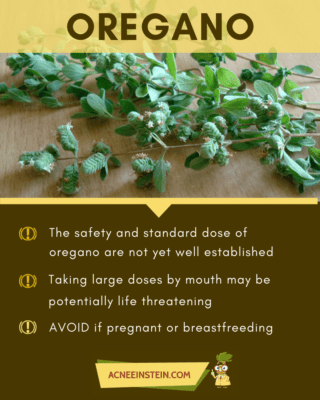
Lemon Oil
Lemon essential oil may be helpful in acne because of its antibacterial and antioxidant effects. When used in aromatherapy, lemon oils have been shown to reduce stress and improve mood. Reducing stress likely also improves acne and being in a better mood makes it easier to live with acne.
Properties
- Antibacterial
- Antioxidant
- Stress reduction
Safety
Lemon oil is rich in furocoumarins, which can increase the skin’s sensitivity to the sun’s UV rays. Particularly, such effect is more likely in light-skinned people.
Peppermint oil
Peppermint essential oil is highly effective at killing the bacteria associated with acne. Its effectiveness can be boosted by combining it either with pine or eucalyptus essential oils.
Properties
- Antibacterial
Safety
The US Food and Drug Administration has categorized peppermint oil as a “generally recognized as safe” substance. Nonetheless, applying peppermint to the chest and or face of babies and children may cause breathing problems due to the sharp menthol odor.
Peppermint oil is too strong for the skin and may cause irritation. For this reason, you should always mix it with a carrier oil before using.
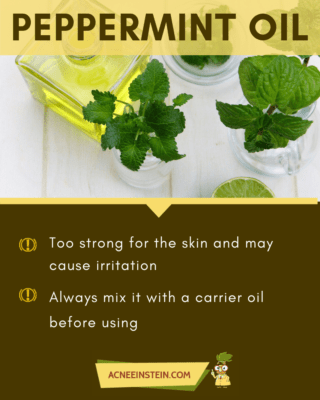
Rosemary Oil
Rosemary oil contains several substances that have been shown to exert anti-acne effects in lab studies. These include – 1,8-cineole, α-pinene, camphor and borneol. Rosemary essential oil effectively kills acne bacteria and has moderate antioxidant effects.
Properties
- Antibacterial
- Antioxidant
Safety
For most people, the amount of rosemary used in the foods and products for oral intake, inhalation, and application on the skin is generally safe. A mouse study found no link between injection of rosemary oil and skin irritation.
It’s not clear whether using it on the skin during pregnancy and breastfeeding is safe. In order to avoid any potential adverse effects, it is better to avoid it if you are pregnant or breastfeed.
Frankincense
While frankincense oil may have many beneficial properties, there’s no scientific evidence to show it has any acne-relevant benefits.
Clary Sage
Clary sage oil might offer acne relief through its anti-stress, anti-inflammatory, and antibacterial properties.
Properties
- Anti-stress
- Anti-inflammatory
- Anti-bacterial
Possibly, its estrogen-like activity may help to reduce acne. This might work for women who have hormonal acne due to a drop in estrogen levels. However, the study did not clearly show that clary was responsible for the rise in estrogen.
Safety
It is generally safe in the amounts used in the products. Likewise, its use during pregnancy and breastfeeding is considered safe.
Eucalyptus oil
Eucalyptus essential oil is among the more promising essential oils for acne. It’s highly effective at killing acne bacteria, both alone and in combination with peppermint essential oil. Lab studies show that eucalyptus oil affects the sebum-producing cells and may make the skin less oily.
Properties
- Antibacterial – Certain chemicals, most notably, gamma-terpinene and alpha-pinene have shown activity against the acne-causing bacteria in lab tests. In fact, the anti-acne activity of eucalyptus oil was just slightly lower than that of commercially available 5% benzoyl peroxide gel.
- Decreased sebum production – In one study that used a rat model of the sebaceous gland found that eucalyptus oil decreased sebum production and prevented worsening of acne.
Safety
Eucalyptus oil can cause problems if you apply it directly to the skin without diluting. Therefore, always dilute it before applying to the skin.
Pregnant women, those who breastfeed, and children should avoid using it.
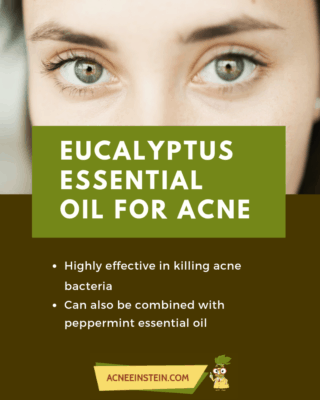
Choosing the right carrier oil
The success of essential oil treatment depends not only on the essential oils used, but also what carrier oil you choose. When choosing a carrier oil, you should pay attention to two things:
- The ratio of oleic and linoleic acids. Oleic acid has been shown to cause skin irritation (see the post about olive oil for details) whereas linoleic acid tends to soothe the skin. The oils that have significantly more oleic acid than linoleic acid thus tend to be more irritating.
- Comedogenicity. While comedogenicity is usually not a concern when evaluating skin care products, it may be a problem when it comes to oils. Comedogenicity is the main concern with coconut oil.
The best carrier oils include:
- Evening primrose oil (Oenothera biennis) – It has a light and sweet-smelling aroma. One study shows that its high content of gamma-linolenic acid might be useful in treating skin conditions that cause excessive dryness such as eczema. Nevertheless, due to its high fatty acid content, it tends to degrade rapidly.
- Rosehip oil (Rosa mosqueta) – RIch in antioxidant vitamins C and E, rosehip oil has powerful antioxidant as well as anti-inflammatory effects. Most importantly, it has a high ratio of linoleic acid to oleic acid, which makes it a perfect carrier oil for skin conditions including acne.
- Sunflower oil – Sometimes you just want to keep things simple. Sunflower oil has among the best oleic to linoleic acid ratios. Plus it’s cheap and easily available from almost any supermarket.
Here are carrier oils that are commonly recommended but that we believe you should steer clear from:
- Jojoba oil – It is obtained from the seeds of the jojoba plant and is actually a wax. It moisturizes the skin and may help people with acne as it can reduce sebum production. Moreover, it does not clog the pores and is easily absorbed into the skin. However, it contains more oleic acid (11.2%) than linoleic acid (5%), which might blunt its beneficial effects.
- Coconut oil – The source of coconut oil is the meat of coconuts. It contains large amounts of fatty acids and polyphenols that nourish the skin. However, coconut oil is highly comedogenic and has a score of 4 out of 5 in the comedogenicity rating. In addition, it high content of the irritating oleic acid (5-10%) compared to the soothing linoleic acid (1-2.5%) might make it a less preferable carrier oil. See our coconut oil post for more info.
- Olive oil – Almost all articles about essential oils recommend olive oil as a carrier oil. However, the very high oleic acid content makes olive oil a poor choice. Several studies have shown olive oil can irritate and damage the skin.
- Almond oil – Obtained from the kernels of almonds, it has a strong nutty odor and is easily absorbed into the skin. In addition, it has powerful moisturizing properties. Even so, it has a high ratio of oleic acid (64-82%) to linoleic acid (8-28%), which might be a concern for some people.
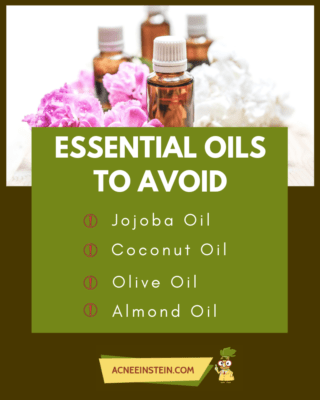
Takeaways
Some essential oils, namely tea tree, lemon, and eucalyptus have exhibited promising anti-acne benefits in numerous studies. For this reason, it is worthwhile to try one or more of these oils if you have mild to moderate acne. Just do not forget to dilute it with a carrier oil before applying.
Using essential oils for acne is easy and quite unlikely to cause any serious side effects. Moreover, you can get these oils without a doctor’s prescription.
However, if you have severe acne, you should always seek a professional help and inform your doctor before using any non-prescription products.


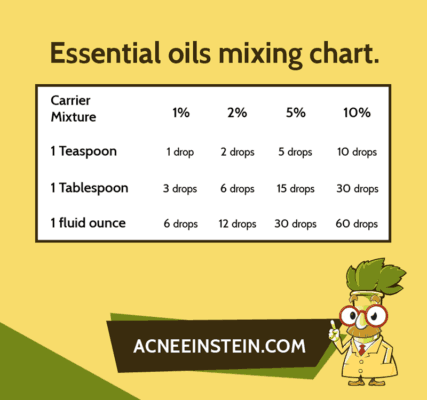
Tea tree essential oil works well. It has a strong bactericidal ability, including bacteria and fungi. Acne vulgaris is caused by Propionibacterium acnes, and seborrheic dermatitis and fungal acne are caused by Malassezia. Tea tree essential oil has a strong ability to kill these two kinds of bacteria, and it is very suitable for treating acne caused by imbalance of the flora.